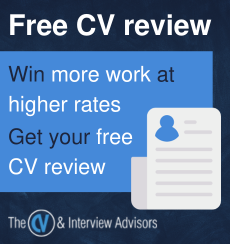Contractors' Questions: How to tackle 'CV blocking'?
Contractor’s Question: I received a phone call from Agent A. We discussed the role; he sent the job description and asked me to send an email to his agency stating that I agree for them to represent me to the client. After three days, Agency B called for the same role. I told them that another agency has submitted my CV to the client.Agency B went to the client and checked, apparently to find that my CV had not been submitted by Agent A. I then gave permission for Agent B to submit my resume to the client.
But Agency A calls again on the fourth day, still not being able to confirm if my resume had been submitted by him. I told him that since my CV was not submitted by him/A, I have told B to submit it.
However now Agency A claims that my CV has not been submitted by Agent B, and is keen to add that they would be happy to proceed and submit my CV to the client, based on my original email to them. Personally, I think both A and B have spoiled my chance of the contract. Is there a recommended approach to get round the 'Agent A&B situation'?
Expert’s Answer: Without knowing a lot more about your circumstances, it is difficult to extensively comment on the specifics but what you have experienced is not, sadly, an unusual situation.
When Agency B said that the client had not received the CV, can you be sure the agency was telling truth? Is it possible that they may have simply wanted to send your CV in speculatively, without worrying whether it had been sent before?
Agency A should have sent your CV on the same day that they received the e-mail from you agreeing to their sending it – it is not entirely clear whether they did. However if they did take three days to send it, then they have lost their edge in this example. In short, I would be a little concerned about both agencies’ efforts. It can certainly be true that when you allow your CV to be submitted from two directions there is a risk that the CV will be ruled out.
Here’s my advice for when two agents are on the scene. When you agree to an agency putting your CV forward to a role that sounds right for you – and especially when you back that agreement up in writing – you should agree only on the basis that your CV will be sent to the client WITHIN 24 hours of them receiving that agreement. The agreement can be verbal and/or written, but state that you will give them 72 hours exclusivity on that role.
Then tell them that any agency calling you about the role within that 72-hour period will be told that you have another agency representing you for that role in that company. BUT this exclusivity shouldn’t last indefinitely. If another agency tells you that your CV hasn’t been put forward, treat that claim with a degree of scepticism. Bear in mind, it isn’t terribly usual for clients to share the names of people that have been submitted with competitor agencies. As a recruiter myself, I put candidates forward in confidence – I don’t expect my clients to give the names of my candidates to my competitors.
So check with the agency that you have agreed to represent you about what is happening on the role. Tell them that you are getting other approaches about the sought-after role and will pursue those approaches if nothing is happening through their agency within an extended period of exclusivity.
But notice that I have referred to the role here – you should also state that you are providing exclusivity on that role only – and not on other roles in other parts of the target/client company.
In summary, and if your circumstances were to reoccur, I recommend that you give the agency who first tells you about the role some exclusive time to develop the opportunity. A good agent works very quickly – they know that speed is crucial in getting the candidates that they have identified and qualified to the attention of the client for consideration. If you have agreed that the role sounds right for you, then there is no benefit to them in not submitting your CV extremely quickly.
Over time, I recommend that you select only a few agencies to work with on a regular basis – that way, relationships and trust develop. If you have to deal with agencies that you don’t know, take time to ask how they work – for example, how quickly you should expect feedback and advice on a role? Don’t be afraid to visit them to meet the person putting you forward – if they try to avoid meeting you then that’s a bad sign.
A good recruitment business is based on relationships and, as a result, trust. Our business has always worked in that way and always will. In short, the good agencies can be trusted to work hard to get you that role – that’s the only way they get paid!
The expert was Jeff Brooks, chairman of IT recruitment firm Prime Sourcing Ltd.
ContractorUK has partnered with the UK's leading authority on contractor CVs to provide a FREE review of your CV and LinkedIn profile. Contact The CV & Interview Advisors and one of their team will get back to you to discuss if your CV and LinkedIn profile matches up with industry best practice.


